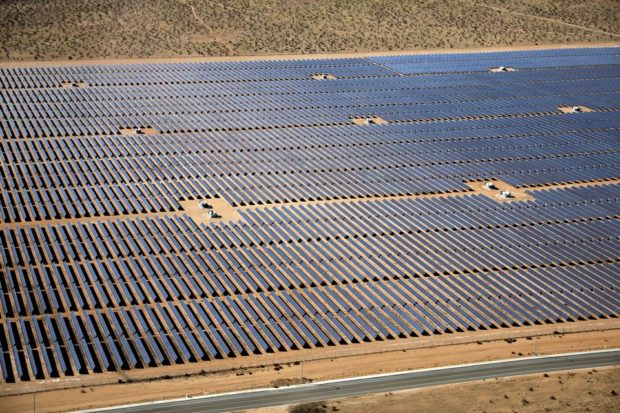
An array of solar panels is seen in the desert near Victorville, California, U.S. March 28, 2018. REUTERS FILE PHOTO
U.S. trade officials on Monday said they will launch an investigation that could result in tariffs on solar panels imported from four Southeast Asian nations, a blow to clean energy project developers that rely on cheap imports to keep costs down.
The Commerce Department’s decision regarding imports from Malaysia, Thailand, Vietnam and Cambodia was a victory for Auxin Solar. The San Jose, California-based solar manufacturer this year requested the probe, arguing that Chinese manufacturers shifted production to those nations to avoid paying U.S. duties in place for nearly a decade on Chinese-made solar goods.
Auxin’s petition is the latest in a string of efforts by U.S. solar producers to stem the flow of cheap Asian panels that they argue make their products unable to compete in the market.
Solar industry trade groups said the investigation alone would immediately hamstring project development and harm U.S. progress in addressing climate change. President Joe Biden has set a goal of weaning the U.S. electricity sector off of fossil fuels by 2035, a target that could propel solar to supply up to 40% of the nation’s electricity needs – up from 3% currently.
Imports from the four countries account for about 80% of the panels expected to be installed in the United States this year, according to the American Clean Power Association industry group.
“This decision effectively freezes development in the U.S. solar industry,” association CEO Heather Zichal said on a conference call with reporters. “Frankly, the Commerce Department’s action to initiate this investigation is a disaster for our industry.”
In a statement, a Commerce Department spokesperson said the department would “conduct an open and transparent investigation.”
“This inquiry is just a first step – there has been no determination one way or the other on the merits, and no additional duties will be imposed at this time,” the spokesperson said.
In a memo posted on a Commerce Department website earlier in the day, officials said Auxin had provided information indicating that solar companies operating in the four countries are subsidiaries of large Chinese producers and that products made there would be subject to U.S. countervailing and anti-dumping duties if made in China.
“Auxin properly alleged the elements necessary for a circumvention determination,” the memo said.
The Commerce Department said it will issue a preliminary determination within 150 days.
Auxin welcomed the decision.
“We are grateful Commerce officials recognized the need to investigate this pervasive backdoor dumping and how it continues to injure American solar producers,” Auxin Chief Executive Mamun Rashid said in a statement.
U.S. solar trade groups lobbied heavily against the Commerce Department taking up the petition. On Monday, they said projects will now be forced to decide whether they can move forward given the potential for new tariffs that could sharply increase their cost. Solar panels make up about half the cost of a large-scale system.
RELATED STORIES
As renewable energy takes over, ways sought to manage its byproduct—wastes
Embracing the light: Churches tap solar power
US bans imports of solar panel material from Chinese company
Space-starved Singapore builds floating solar farms in climate fight
PH solar power plants among Southeast Asia’s top 25